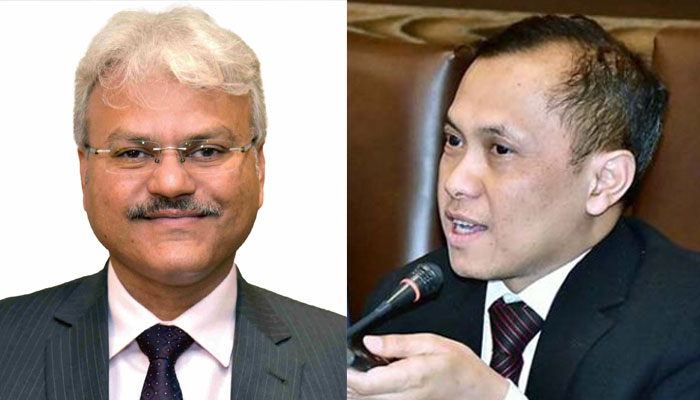Indonesian envoy visits FPCCI regional office
LAHORE: Charge d’Affaires of the Indonesian Embassy Rahmat Hindiarta Kusuma visited the regional office of the Federation of Pakistan Chambers of Commerce and Industry (FPCCI) on Wednesday and held talks with its chairperson and vice president, Zaki Aijaz.
The discussion mainly focused on exploring avenues for increased trade and investment cooperation and bolstering collaboration in various sectors, including technology, and business-to-business exchanges.
Aijaz, the FPCCI’s regional chief, emphasized the importance of people-to-people and business-to-business linkages in driving bilateral economic ties.Kusuma highlighted Indonesia’s strategic position as the gateway to Southeast Asia’s 650 million strong population, the world’s third-largest market. He described Indonesia as the region’s largest economy with stable growth and the world's 16th largest, boasting $1 trillion GDP.
The Indonesian envoy offered support from Indonesian banks, both national and international, to Pakistani businesses. He stressed the need for stronger connections between the two nations’ business communities, underscoring the potential for mutual benefit.
Kusuma advocated for expanded cooperation in tourism, education, healthcare, and information technology sectors.Aijaz reciprocated, pointing to significant potential for Pakistan to strengthen trade and investment with Indonesia in areas like agriculture, textiles, information technology and tourism.
He acknowledged the current trade volume between the two countries as “not impressive”, with Pakistan primarily exporting textiles, surgical instruments, and sports goods, while importing palm oil, coal, and paper products.
-
 Why Ariana Grande Wants A 'tiny Mouse' To Play Her In Biopic?
Why Ariana Grande Wants A 'tiny Mouse' To Play Her In Biopic? -
 Wind Chill Returns With Brutal Cold As Polar Vortex Stalls Over Canada
Wind Chill Returns With Brutal Cold As Polar Vortex Stalls Over Canada -
 Costco $20 Rule Explained As Employee Pay Climbs Across North America
Costco $20 Rule Explained As Employee Pay Climbs Across North America -
 Strange Incident Happened At Nancy Guthrie's Home On Abduction's 10th Day
Strange Incident Happened At Nancy Guthrie's Home On Abduction's 10th Day -
 Tumbler Ridge School Lockdown Underway As RCMP Investigate School Shooting
Tumbler Ridge School Lockdown Underway As RCMP Investigate School Shooting -
 Britney Spears Quietly Parts Ways With Her Music Catalog: Report
Britney Spears Quietly Parts Ways With Her Music Catalog: Report -
 Princess Diana Bodyguard Suspected ‘she Could Die’: Here’s How
Princess Diana Bodyguard Suspected ‘she Could Die’: Here’s How -
 Teddi Mellencamp Marks Huge Milestone With Emotional Message Amid Cancer
Teddi Mellencamp Marks Huge Milestone With Emotional Message Amid Cancer -
 King Charles Makes It ‘absolutely Clear’ He Wants To Solve Royal Crisis
King Charles Makes It ‘absolutely Clear’ He Wants To Solve Royal Crisis -
 Kylie Jenner Looks Back With 'grace' On Early Fame Years: 'Just Being Myself'
Kylie Jenner Looks Back With 'grace' On Early Fame Years: 'Just Being Myself' -
 Royal Family Warned To ‘have Answers’ Amid Weak Standing
Royal Family Warned To ‘have Answers’ Amid Weak Standing -
 Marc Anthony On Why Bad Bunny’s Super Bowl Show Mattered
Marc Anthony On Why Bad Bunny’s Super Bowl Show Mattered -
 Kid Rock Gets Honest About Bad Bunny’s Performance At Super Bowl
Kid Rock Gets Honest About Bad Bunny’s Performance At Super Bowl -
 Kylie Jenner Reveals Real Story Behind Her 'The Moment' Casting
Kylie Jenner Reveals Real Story Behind Her 'The Moment' Casting -
 Jaafar Jackson Breaks Silence On Becoming Michael Jackson
Jaafar Jackson Breaks Silence On Becoming Michael Jackson -
 Eva Mendes Admits She Was Jealous Of Ryan Gosling’s CGI ‘girlfriend’ Rocky
Eva Mendes Admits She Was Jealous Of Ryan Gosling’s CGI ‘girlfriend’ Rocky




